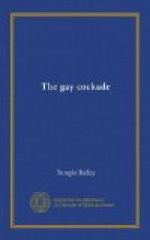When she waked in the morning, it was with, the remembrance of his tenderness. Well, of course he was sorry for her. Anybody would be. But Christopher was sorry, too. And Christopher had something to offer her—more than Ridgeley—yes, it was more—
She was half afraid to go down-stairs. Christopher would be at breakfast on the porch. Jeanette would be there, pouring coffee, and perhaps Ridgeley if he had no calls. And Christopher would talk in his gay young voice—and Ridgeley would read the newspaper, and she and Christopher would make their plans for the day—
She rose and began to dress, but found herself suddenly panic-stricken at the thought of the plans that Christopher might make. If they motored off together, he would talk to her as he had talked in the grove of birches—of the temple bells, and of the desert, and the strange harbors—and how could she be sure that she would be strong enough to resist—and what if she listened, and let him have his way?
She decided to eat her breakfast in bed, and rang for it. A note came up from Christopher. “Don’t stay up-stairs. Ridgeley left hours ago, and I shan’t enjoy my toast and bacon if you aren’t opposite me. I have picked a white rose to put by your plate. And I have a thousand things to say to you—”
His words had a tonic effect. Oh, why not—? What earthly difference would it make? And hadn’t Browning said something like that—“Who knows but the world may end to-night?”
She was not sure that was quite the way that Browning had put it, and she thought she would like to be sure—she could almost see herself saying it to Christopher.
So she went into her husband’s room to get the book.
Ridgeley’s books were on the shelf above his desk. They had nothing to do with his medical library—that was down-stairs in his office, and now and then he would bring up a great volume. But he had a literary side, and he had revealed some of it to Anne in the days before he had been too busy. His Browning was marked, and it was not hard to find “The Last Ride.” She opened at the right page, and stood reading—an incongruous figure amid Ridgeley’s masculine belongings in her sheer negligee of faint blue.
She closed the book, put it back on the shelf, and was moving away, when her eyes were caught by two words—“For Anne,” at the top of a sheet of paper which lay on Ridgeley’s desk. The entire page was filled with Ridgeley’s neat professional script, and in a flash the gesture which he had made the night before returned to her, as if he were trying to hide something from her gaze.
She bent and read....
Oh, was this the way he had spent the hours of the night? Searching for words which might comfort her, might clear away her doubts, might bring hope to her heart?
And he had found things like this: “My little sister, Death,” said good St. Francis; ... “The darkness is no darkness with thee, but the night is as clear as day; the darkness and light to thee are both alike...” “Yea, though I Walk through the Valley of the Shadow ...” These and many others, truths which had once been a part of her.




